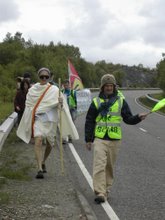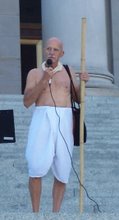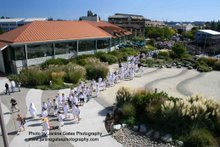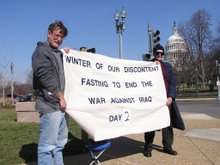Today is the 14Th day since I returned from Vietnam. I am going through a many faceted reentry. First, of course is the recovery from the jet lag and red eye flights from Vietnam and Korea. This has been complicated by a head cold which started in Vietnam, and which I thought was cured there, but has not ceased. Second, I am still thinking about the whole experience of the victims of Agent Orange. The stated need by VAVA (Vietnam Association of Victims of Agent Orange) is US and chemical company assistance for the victims, including an apology. Third, I am reviewing and analyzing the issue of "sacrifice." Why do humans sacrifice their own people and their enemies as was done with Agent Orange, but is done in all wars? Fourth, the economic meltdown is demanding every one's attention. I have been spending some time going into that since it is affecting me and family members. Back to the first named, my energy is gradually returning.
My sense is that "we are in deep trouble." Analysts, including both the new President Obama and the past President Bush, do not have a handle on the economic meltdown. The word "Great Depression" was mentioned by Bush in his closing press conference (See Tom Englehardt's comments in Truthout.org) and creeps into conversations with a number of sources. No one wants to name it with certainty. Yet, the sense of the words that I am receiving is that this may be even more devastating or unwieldy (I'm reaching for the right words here) than the Great Depression. Those who have been reading this blog for the last nearly two years know that things are even more involved than the economy. How do you be "real" or "realistic" in this situation, without panicking or going into pessimism? I'm trying to name the elephant in the living room without the pessimism. But, no one knows the name of the elephant!
I return to Richard Heinberg's hope: After the 21st Century, one hundred years from now, whoever survives could live in a more human world, a more congenial civilization. We have the know how for that due to insights into human nature garnered of late. We also have the capability to continue laying waste to Mother Earth and each other.
I just read an article in the current issue of The Journal of Psychohistory about the effects of the Black Plague in the 13Th and 14Th centuries. The flux in all the facets of the way of life at that time enabled the survivors to make many gains in social relationships and in human life conditions. This was like the Chinese meaning of "chaos", i.e. opportunity. The normal patterns went out the door when the plague entered. Change happened.
Does not this remind us of what is happening on a small scale at this time, so far? A black president promising change has been elected and his/our opportunity has been "enhanced" due to all the issues raining down upon us: economic melt down, global climate change, wars, resource depletion.
I am still taken up by the human and environmental sacrifice due to Agent Orange in Vietnam and will do what I can to support the peoples there and here (our veterans and their families.) However, I must connect that reality to the others. This is our "opportunity." For me, the opportunity requires forming a deeper faith and discipline of will.







